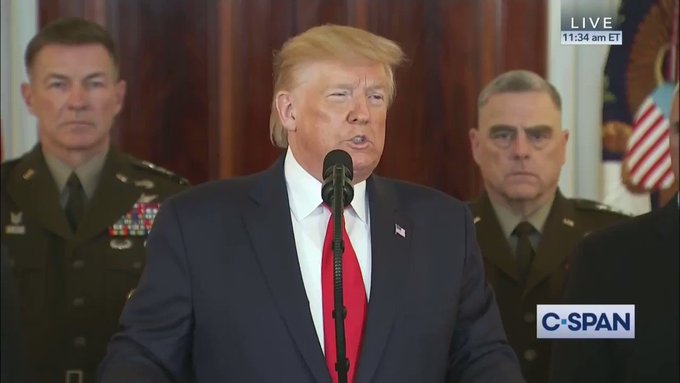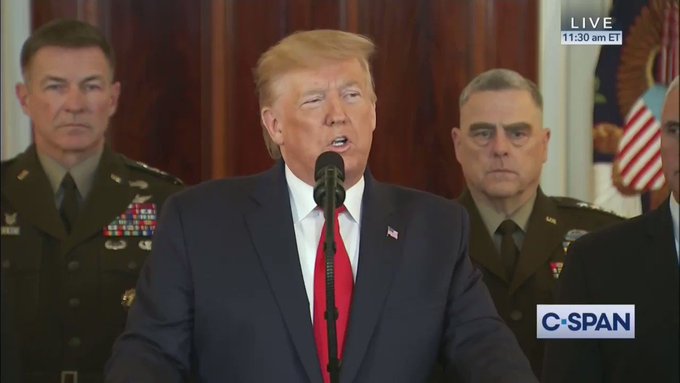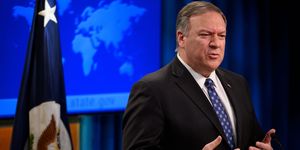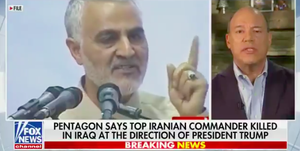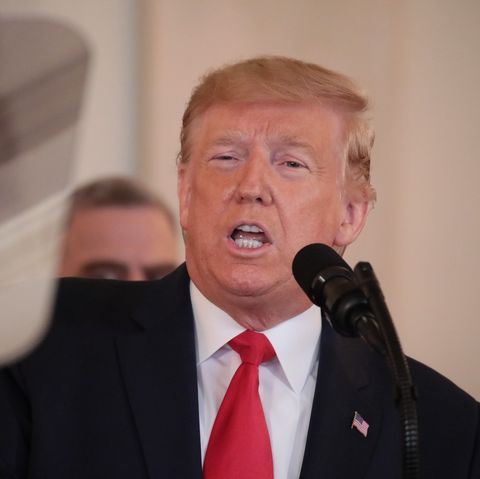
(I have highlighted a particular section, since it is an area of importance that
I have written about over the last few years.- DAVID MCDONALD, WWW.SEARCHINGFORREASON.NET
It remains incredible to watch the people on the teevee respond to a speech from the President of the United States, breathing heavily and frequently slurring his words, as if another basically normal thing just happened. We spend our days now trying to decipher whether a former game-show host with a perpetual goggle-tan and zero impulse-control has a strategy to solve one of the most persistent and complicated geopolitical crises of the last half-century. Historians will marvel at this phenomenon, assuming we make it that far.
That said, it appears Donald Trump hit the most important notes in his speech from the White House Wednesday morning, in that he signaled some openness to diplomacy and seemed to get the message from the Islamic Republic's Tuesday night missile strike on a U.S. military base in Iraq. Iran clearly felt it had to respond after the U.S. assassinated its second-most important figure in Qasem Suleimani, but the Iranians made it clear they were not seeking an immediate escalation. (Many observers point out that there's every chance the long-term Iranian response—the real response—has only just begun.) Trump essentially announced there would be no immediate military escalation, but he did provide further evidence that the "assassination" label is justified with respect to Suleimani's killing. He offered no proof of the "imminent attack(s)" his administration used to say Suleimani was orchestrating against Americans, and which therefore justified the strike.
Trump did say the U.S. will ratchet up sanctions on Iran, however, and that will not serve to defuse things. The start of the current disaster was Trump's decision—against the advice of his top military brass—to unilaterally withdraw the United States from the Joint Comprehensive Plan of Action. That's the agreement reached in 2015 between Iran and a coalition of the U.S. and its European allies, where those Western powers lifted crushing sanctions on the Iranian economy in return for Iran's pledge to halt its development of a nuclear weapon. The Iran Deal was the result of years of work, and it included verification measures with which the world powers could monitor whether the Iranians were complying with the agreement. But it was also a signature achievement of Barack Obama, so Trump blew it up—despite the fact Iran was indeed complying—and reimposed sanctions without support from the Europeans. They all stayed in the deal.
Since the deal was blown up, the U.S. and Iran have been locked in a cycle wherein the U.S. imposes sanctions, Iran responds with (often indirect) aggression, and the U.S. responds by imposing more sanctions. The Iranians consider the sanctions economic war, as the cost of living—including the cost of food—has skyrocketed within the country. This has put the regime under domestic pressure, which is part of the point, but that pressure is likely to cause more conflict, not less. (Also, there's the ethical question of whether the U.S. should make the poorest Iranians suffer here, particularly when we torpedoed the previous agreement.) Meanwhile, Trump announced he will ask the Europeans to get out of the JCPOA, which the president once again railed against with a series of lies and distortions, and ask their and NATO's help in getting a new deal. Suddenly, the president likes NATO again. Not long ago, it was "obsolete." It's almost like we're flying by the seat of our pants here.
It seems like the best-case scenario, then, might be a deal similar to the OG, but which Trump slaps a new name on to save face. Anyone with a genuine interest in avoiding another disastrous, un-winnable war should happily accept that outcome. It just seems strange to expect it from a man with no discernible ability to think strategically or plan for the future beyond dinnertime. A few years ago this guy was holed up in a fake boardroom issuing edicts on which washed-up celebrity should be booted off his reality show. Often, his decisions were so incongruous with what the contestants had actually done in the rest of the episode that the producers were forced to "reverse-engineer" everything that came before to justify his decision.


